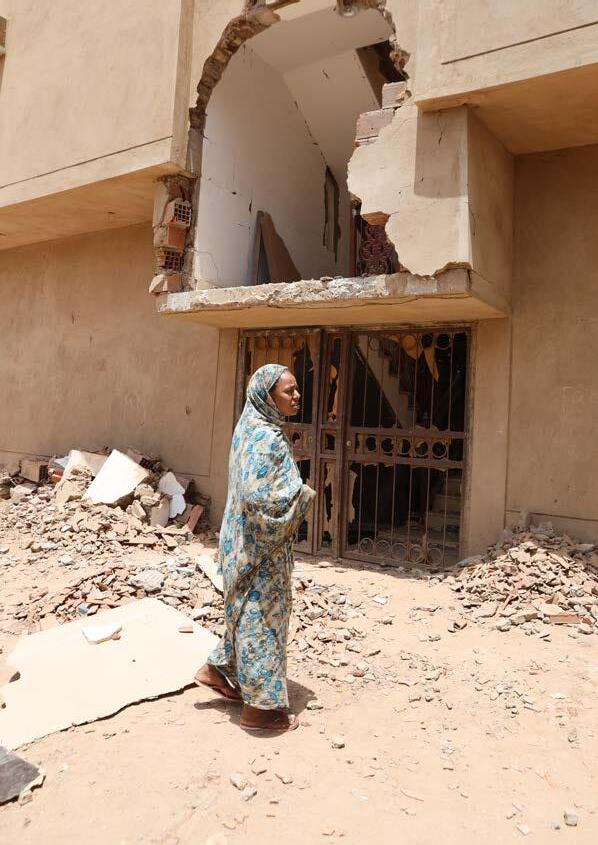

Feminist Peace & Solidarity Conference on Sudan
Published February 2024
All rights reserved. No part of this publication may be reprinted or reproduced or utilized in any form or by any means electronic, mechanical or other means now known or hereafter invented including copying and recording, or in any information storage or retrieval system, without permission in writing from the publishers.
Strategic Initiative for Women in the Horn of Africa
P.O. Box 2793 Kampala – Uganda www.sihanet.org
©SIHA Network 2023
Cover photography by: Faiz Abubaker
Design by: Diana Namanda
Summary
The “Feminist Peace and Solidarity Conference: Women Leading Peace” was a significant event organized by the Strategic Initiative for Women in The Horn of Africa (SIHA) Network from November 22-23, 2023. The conference focused on Sudan’s crisis through a feminist lens, highlighting women’s roles in peacebuilding and conflict resolution. It brought together over 140 participants, including Sudanese women and activists, international human rights organizations, UN agencies, and women’s rights activists from across the continent. The conference featured heartfelt narratives, with speakers recounting the horrors of conflict, leading to moments of tears and healing, facilitated by meditation specialists. It was a space of collective healing and renewed hope, as participants collaboratively sought ways forward.
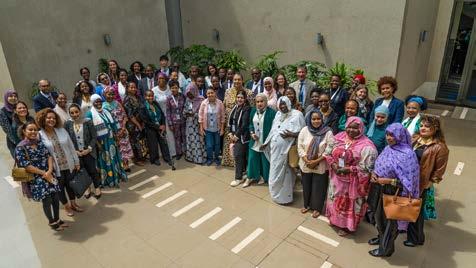
The conference featured insightful discussions and interactive sessions, emphasizing the challenges women face in conflict situations and their historical marginalization in peace processes and women’s essential roles in peacebuilding and conflict resolution. Key outcomes from this event include a strong conference statement (Annex 1) advocating for the prioritization of women in peace initiatives. Recommendations were made for women’s active involvement in peace processes, the necessity of policy reforms for gender equality, and the call for international support for women in conflict zones. The conference underscored the critical role of women in achieving sustainable peace solutions.
The event was a platform for sharing experiences, addressing socio-economic challenges in post-conflict settings, and fostering a deeper understanding of the unique difficulties faced by women in these environments. It marked a step forward in recognizing and amplifying women’s voices in peacebuilding efforts, reflecting a growing commitment to inclusive and equitable peace processes.
It is essential to remind ourselves that this extreme violence against civilians currently happening in Sudan is not happening in a vacuum; it is the outcome of over 20 years of violence and atrocity against the people in Darfur and South Kordofan, but also a direct outcome to impunity and neglect of the importance of accountability by international actors.
Hala Al-Karib, Regional Director SIHAFeminist Peace
Introduction
Conference on Sudan
Convened by the Strategic Initiative for Women in the Horn of Africa (SIHA) Network with support from Idea International, African Women Development Fund (AWDF), and the Ministry of Netherlands under the We Cannot Wait Project, and logistics support from with the University of Nairobi’s Department of Diplomacy and International Studies and FEMNET, this conference represented an important gathering in the context of Sudan’s transformative journey. The conference was a testament to the role Sudanese women played in the December Revolution, moving beyond traditional participation to roles as organizers, strategists, and agents of social change. Despite the significant contributions of women to the revolution, women’s rights and agendas took a backseat in the post-revolution transition, with limited female representation in critical negotiations and councils.
However, the momentum of Sudanese women, fueled by the Revolution, persists as they continue to push for a meaningful role in shaping Sudan’s future. The conference was a critical step in this journey, providing a platform for over 50 women from various parts of Sudan to share experiences, begin the healing process, and discuss strategies for future collaboration. It focused on creating a safe space for dialogues, acknowledging the diverse backgrounds of women participating in the revolution, and addressing key themes such as intersectionality in the women’s movement, challenges in conflict zones, women’s access to justice, and the lack of resources and funding to support humanitarian workers in Sudan.
With the theme “Women Leading Peace,” the conference served as a rallying call to focus on women’s resilience and solidarity under challenging circumstances. It offered a space for expert-led panels, interactive sessions, and narrative sharing, delving into the Women, Peace, and Security (WPS) agenda from a feminist perspective. The event highlighted not just the conventional aspects of these discussions but also the nuanced, impactful layers often missing from mainstream narratives.
In the face of Sudan’s challenges, our collective voice carries immense weight. It’s about more than just articulating issues; it’s about envisioning and shaping the Sudan we desire – one that truly represents its diverse voices. Accountability and human rights protection must be at the forefront, particularly for women and young girls. By networking and collaborating, like in forums such as IGAD, we can address these issues more effectively.
Hon Hanna Tetteh, Special Envoy of the Secretary-General for the Horn of AfricaThe conference’s objectives centred on amplifying Sudanese women’s voices, addressing their marginalization in peace processes, and fostering gender-sensitive peacebuilding approaches. It aimed to create synergies among women leaders, activists, and experts across Africa, sharing experiences and best practices to advance women’s roles in peace and security.
Utilizing an engaging approach, the conference included panel discussions, interactive conversation stations, a healing and reflection sanctuary, and storytelling and artistic expressions. This multifaceted methodology ensured inclusivity and diversity, allowing for a comprehensive understanding of the issues at hand. A collective outcome statement summarized the insights and recommendations, underlining the conference’s commitment to developing sustainable strategies for women’s involvement in peace processes.
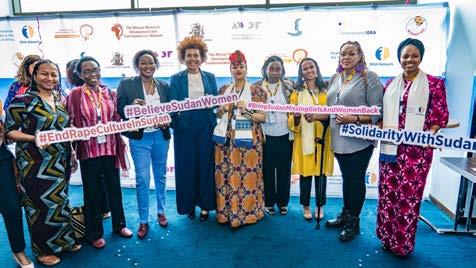
Opening
The Women Leading Peace Conference began with a focus on empowering women as key participants in peace processes, addressing Sudan’s crisis and long-term peace-building strategies. The first day set a foundational tone, emphasizing the empowerment of women, and exploring the root causes of conflict, with special attention to gender-based violence and the political marginalization of women. It featured an opening ceremony, keynotes, and personal testimonies from women affected by the conflict, highlighting the urgency of collaborative action for meaningful change.
Keynote addresses from various speakers wove together a tapestry of perspectives, each contributing to the overarching theme of women’s empowerment and peacebuilding. Hala Al-Karib of SIHA highlighted the need to address violence against women and the involvement of state and non-state actors. Dr. Monica Juma’s address, delivered by Dr. Damaris Manyange, emphasized international collaboration and Kenya’s commitment to regional stability.
Ms. Hanna Tetteh, the UN Envoy to the Horn of Africa, focused on accountability, human rights protection, and advocating for increased women’s participation in peace processes. Prof. Ambassador Maria Nzomo called for breaking through patriarchal structures to amplify women’s voices in leadership.
Giles Lever, the British Ambassador to Sudan, stressed the UK’s support for peace
Women’s participation in peacekeeping missions is dwindling, and it’s disheartening to see Sudanese women’s rights denied. Every challenge presents an opportunity – we cannot accept a government that sidelines inclusivity. Women must assert their presence, amplifying their voices until they resonate in every hall of power. Our struggles with hegemonic masculinity and patriarchy in leadership are ongoing battles. We must dismantle these structures to create safe spaces for women. Leveraging technology is key; it’s a tool that can magnify our voices globally. Remember, positions are earned, not given. African unity hinges on women’s solidarity in social justice. Continuous capacity building is essential – plan, be vocal, and become a champion for your cause.
Prof Amb Maria Nzomo, University of Nairobiand gender equality, emphasizing proactive participation by women in political processes. Together, these addresses underscored the multidimensional approach needed for effective peacebuilding and women’s empowerment and the necessity of their involvement in peace processes.
Concluding the opening session, a Kenyan theatre group presented “Voices of Resilience: Survivors Speak Out Against SGBV in Sudan.” This powerful performance vividly portrayed the realities of sexual and gender-based violence (SGBV) in Sudan. The actors’ emotive storytelling brought to life harrowing experiences of violence and injustice, leaving the audience deeply moved and highlighting the urgent need to address SGBV. The portrayal underscored the importance of amplifying survivors’ voices and taking decisive actions to seek justice and prevent such atrocities. This impactful session set a tone of empathy and urgency for the conference, reinforcing the commitment to combatting SGBV in conflict areas.
Day One: Foundations of Empowerment and Justice in Conflict Resolution.
Day one of the conference set the stage for the exploration of the roles and challenges women face in conflict situations. The day focused on understanding the context of sexual and gender-based violence in conflict zones, delving into the politics of this violence within the Horn of Africa, and examining women’s integral roles in peace and security. The sessions aimed to establish a foundational understanding of these complex issues, highlighting the need for empowerment, justice, and effective conflict resolution strategies that prioritize women’s experiences and contributions.
The Politics of Sexual Violence in the Horn of Africa: Sudan Case Study
This panel provided a profound exploration of sexual violence as a systematic tool of warfare in Sudan, underlining its devastating impact on communities. Moderated by Yosra Akasha, the panel included Sulaima Ishaq Elkhalifa, Salma John, Olivia Bueno, and Nour Mohamed Dai, who each brought unique perspectives to the discussion.
The session’s main focus was on understanding the complexity of sexual violence in conflict zones, with a special emphasis on Sudan. It delved into the systemic issues that perpetuate this violence, the role of ethnicity in victimization, and the various challenges in supporting survivors. The discussions also touched on the health and well-being impacts of this violence.
One of the key themes highlighted was the underfunding and the complicating role of international forces in providing access to humanitarian aid. The panellists stressed the necessity of comprehensive and integrated strategies to address the root causes of violence against women effectively. Olivia Bueno, with her background in human rights advocacy, emphasized viewing sexual violence in conflict zones as deliberate targeting rather than collateral damage. She advocated for increased international support and timely interventions to protect women in these areas.
The political space sees women as reproductive beings with no other obligation in the society. People, especially those in authority, demean women and would like to use women in sexual activities only. It is very disappointing to see women languish in the hands of soldiers and government officials. The ones protecting us are the ones threatening our lives.
Sulaima Ishaq Elkhalifa, Director, Combating Violence against Women Unit at the Transitional Government
Nour Mohamed, a pharmacist and humanitarian volunteer, brought attention to the significant challenges in advocacy, particularly in providing support and healthcare to survivors amidst geographical and cultural barriers. She underscored the importance of ensuring the safety and anonymity of young women working against sexual violence. Salwa Hassan shared her personal experiences as a survivor of the Darfur genocide and her professional focus on SGBV. She highlighted the urgent need for specialized healthcare for survivors, particularly pregnant women, and the establishment of confidential spaces for survivors to seek healthcare safely while
Sulaima Ishaq Elkhalifa, an expert in child protection and gender-based violence mitigation, discussed the systemic and political issues exacerbating sexual violence. She emphasized the need for a fundamental shift in societal attitudes and government policies.
Key takeaways from the session included the systemic nature of gender-based violence, the critical role of political and cultural factors in perpetuating violence, the urgent need for comprehensive healthcare, and the importance of advocacy and support for survivors. These themes underscored the complexity of addressing sexual violence in conflict areas. The session concluded with recommendations for comprehensive approaches that integrate gender considerations into reconstruction frameworks and promote women’s active involvement in decision-making processes, especially in post-conflict reconstruction. There was a unanimous call for accountability mechanisms, eradication of impunity, and increased international support to address the challenges related to sexual violence. The session’s highlighted the need for continued dialogue, research, and collaborative efforts to develop effective strategies that address both the immediate needs of survivors and the root causes of such violence.
Women, Peace, and Security in Policy and Practice
The session, moderated by Faizat BadmusBusari provided a platform for an in-depth discussion on the intertwining roles of policy and practice in enhancing women’s empowerment and security in the Horn of Africa, with a particular focus on Sudan. The session opened with a discussion on the systemic issue of sexual violence in Sudan, with panellists shedding light on the systemic failures in response, the lack of accountability, and the insufficient support for survivors. This discussion provided a context for broader conversations on women, peace, and security policies. The limitations in representation and influence of women in peace processes were critically examined.
Political parties are the first problem in our struggle for peace. Many women give up in political parties due to no right to participation. If we cannot be heard, we cannot change anything no matter how many conferences we hold. Political parties must play an influential role. Women should be given rights to make decisions. ….. Tyrannical masculinity should be dismantled.
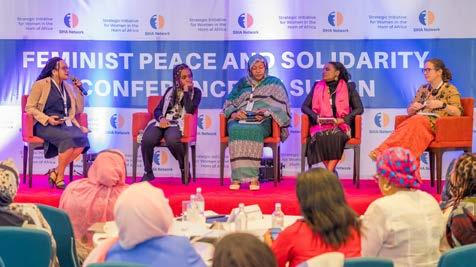
Samah Osman’s expertise in gender, conflict, peace, and security stressed the significance of grassroots efforts in peace processes and the necessity of diverse voices in peace negotiations. Amira Osman Hamed, a well-known women’s rights activist, provided insights from her participation in the Juba peace process. She highlighted the substantial challenges women face in securing representation and meaningful roles within peace negotiations while Dr Guma Kunda Komey’s extensive experience in peace and conflict resolution illuminated the gap between theoretical frameworks and the practical implementation of peace agreements. He emphasized the importance of sincere implementation of women’s agendas and the integration of grassroots and intellectual women’s movements.
The session identified several key themes, such as the systemic nature of sexual violence, the crucial role of political and cultural factors in perpetuating violence, and the need for comprehensive healthcare and advocacy for survivors. A recurring point was the critical gap between policy and action, particularly in responses to sexual violence and the need for accountability, representation, and influence of women in peace processes.
You can see the difference between the peace as a document and peace as what the political leader describes it. Same leaders who signed the peace agreements are those who prepared the ground for the second war. In summary, we have never had peace in Sudan. All peace agreements produced only allowed for a period of truce.
Dr Guma Kunda Komey, Head of Peace Programs and Deputy of Senior Country Representative at the Carter Centre, SudanIn conclusion, this session highlighted the manifold nature of challenges and opportunities in policy and practice related to women, peace, and security. The discussions highlighted the critical importance of bridging the gap between policy formulation and effective implementation. This necessitates a holistic approach integrating policy reform, advocacy, and grassroots participation. The speakers collectively called for ongoing advocacy, policy reforms, and enhanced international cooperation to advance women’s rights and empowerment across all levels of decision-making processes.
Women Are Not Collateral Damage in Armed Conflicts. Why Talking About Justice Matters.
If we stop speaking for a moment, people tend to forget the matter and put it aside. We have to keep the women stories at the centre of the stage.
This session, guided by Hala Al-karib, probed the central role of justice in armed conflicts, focusing on women’s experiences. The session was enriched by Yasmin JusuSheriff’s insights on the silencing effect of perpetrators in power, Melvis Ndiloseh’s discussion on the resilience of Sudanese women and administrative challenges in justice, and Inaam Ali Attig’s emphasis on addressing issues like marital rape and the need for robust law enforcement in Sudan. The conversation revolved around the transformative impact of justice on women’s lives, accentuating that women should not be seen as collateral damage but as central figures in the quest for peace and justice.
The session highlighted the systemic challenges in delivering justice in conflict zones, where women’s voices and experiences are often marginalised. The speakers emphasized the necessity of amplifying women’s stories in the fight for justice, advocating for a consistent and vigilant stance against human rights violations. The discussion pointed out the need for systemic changes to ensure women’s well-being and rights are upheld in conflict situations. It stressed the importance of women’s active involvement in peace processes, the removal of administrative and societal
barriers to justice, and the establishment of effective legal frameworks to support survivors.
Criminalizing rape was not allowed in Sudan in the past years, and we want it to be active in our era and in the days to come … To stop the cycles of violence in Sudan we must address the patterns of impunity that dictated all past political agreements.
Summarizing the session, the importance of integrating women’s perspectives in both policy-making and societal narratives was emphasized. The panellists called for enhanced political participation of women, their inclusion in peace negotiations, better funding for women’s organizations, and improved accountability in international organizations. The session concluded with a collective agreement on the need for continued advocacy, legal reforms, and collaborative efforts. These efforts aim to develop effective strategies for justice and accountability in armed conflicts, focusing on addressing the needs and rights of women survivors, and ensuring their voices are not sidelined but are instrumental in the pursuit of lasting peace and justice.
Day Two: Solidarity, Healing, and Collective Action.
Lived Realities of Women and Girls in Conflict
The session, moderated by Dana El Hassan, provided an insight into the experiences of women and girls in conflict zones, particularly in Sudan and Nigeria. The speakers – Munira Askira, Awadia Kuku, Mahitab Mahgoub, and Alwya Baherldien – shared their experiences and expert insights, painting a vivid picture of the multi-dimensional challenges faced by women and girls in these regions.
Mahitab Mahgoub emphasized the socio-economic instability that women endure in conflict zones, discussing the loss of assets, the collapse of infrastructure, and the financial constraints that particularly affect women in the informal sector. Awadia Kuku’s journey from a tea seller to a leader in gender equality advocacy illustrates the power of grassroots movements and the importance of providing skills training and educational access to young girls, especially in refugee camps.
As much as the women were in a miserable state, they struggled to protect other women and children as all the men had either died or left to safety.
Alwya Baherldien brought attention to the humanitarian crisis in Western Darfur, highlighting the specific targeting of ethnic groups by militias and the subsequent impact on women in IDP camps. The need for international attention and support in these areas was underscored. Munira Askira, addressing the crises in Nigeria, spoke of the impacts of armed groups, environmental issues, and economic instability, and stressed the importance of women’s empowerment projects, safe access for humanitarian organizations, and confidential reporting mechanisms for gender-based violence.
The session underscored the resilience and strength of individuals and emphasized the need for holistic solutions that focus on empowerment, protection, and support. The session concluded with several key recommendations: recovery and rebuilding programs for women, education and vocational training initiatives for girls in conflict areas, effective humanitarian assistance in refugee camps, and enhanced protection measures for civilians, particularly women and children, along with advocacy for ending human rights violations.
Humanitarian Aid During Conflict
Moderated by Ilse Wermink, this session focused on the complexities and critical role of humanitarian aid in conflict zones as well as the multifaceted challenges faced by humanitarian organizations and ways of navigating those challenges effectively. Marvin Koop discussed the critical role of technology and innovation in revolutionizing aid distribution, emphasizing how the underutilization of data-driven solutions pointed to untapped potential in humanitarian operations. Margo Derecktor, who focuses on community empowerment, underscored the significance of a bottomup approach, advocating for strategies that empower local communities for more effective and sustainable humanitarian aid.
To the greatest extent, support and responsibility [for sexual violence] must rest with both individual combatants and their seniors. The responsibility needs to be inclusive enough to include commanders and not combatants alone. Evidently, feminist approaches have been instrumental in peace initiatives.
Judy Gitau, Lawyer and Regional Coordinator, Africa, Equality NowJudy Gitau delved into the essence of digital transformation in humanitarian sectors, championing the use of digital tools to enhance communication and coordination, which have the potential to reshape how aid is delivered. Meanwhile, Nazim Sirag brought to the fore the necessity of multistakeholder collaboration, emphasizing the importance of local empowerment and cultural sensitivity in crafting aid strategies.
The session highlighted themes of technological innovation and data-driven solutions, community empowerment and local solutions, comprehensive approaches to sexual violence in conflict, and multi-stakeholder collaboration. It underscored the need for adaptability, inclusivity, and strategic planning in humanitarian efforts, the importance of continuous and stable humanitarian presence, and the transformative role of technology in meeting the dynamic needs of conflictaffected populations.
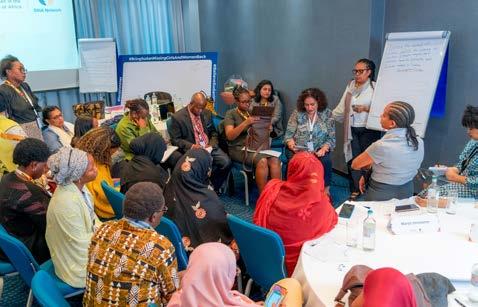
Conflict, Refugees, and Sexual and Reproductive Health
The seventh session, led by Zemdena Abebe and Neimat Abbas, was divided into two conversation circles—one on Northern Ethiopia and one on the challenges facing refugees in Sudan. These conversations, rich in context and emotion, underscored the multifaceted challenges faced by those in conflict zones, particularly women. The first circle brought to the forefront the plight of refugees, the intricacies of their journey to safety, and the trials they face in camps. The second circle highlighted the urgent need for access to healthcare, especially sexual and reproductive health services, in these tumultuous environments.
Adla Abubakr and Sara Ahmed took the participants on a journey into the lives of women affected by the conflict in Northern Ethiopia and the plight of Ethiopian and Eritrean refugees in Sudan. Their stories painted a vivid picture of a region in turmoil, where women bear the brunt of the unrest and displacement. In the process, they pointed to Sudan’s role as a transit country, the existence of approximately 11,000 refugees within 26 camps across Sudan, the manifold challenges refugees faced in Sudan in terms of gaining documentation and travelling to Khartoum, and the ways that refugee status exposed refugees in Sudan to particular vulnerabilities and patterns of abuse.
Matron Awatif, Dr Abrar Alalim, and Dr Sami Mahmoud shifted the focus in this conversation circle to the critical issue of access to sexual and reproductive health in armed conflict situations. This circle brought to light some of the most pressing healthcare gaps and needs facing those caught in the turmoil of war. They pointed to the ways the conflict has escalated maternal mortality risks, the lack of adequate response mechanisms for survivors of sexual violence, the importance of raising awareness of sexual and reproductive health rights, and the ways that grassroots organizations have emerged as beacons of hope and played a pivotal role in the midst of the war.
Both circles painted a vivid picture of the multifaceted challenges faced by those in conflict zones, particularly women. The discussions not only showcased the struggles but also emphasized the significance of comprehensive and multi-faceted approaches to aid, legal protection, education, and grassroots efforts. They stressed the importance of inclusivity, gender sensitivity, and community involvement in both policy-making and grassroots initiatives.
The Aftermath – Reconstruction in The Wake of Conflict
Moderated by Salmah Soliman, the session explored the intricate and demanding process of post-conflict reconstruction. The session’s thematic core revolved around the complexities of rebuilding societies after conflicts. It highlighted the need for a just and inclusive transition that accounts for the social, political, and economic disruptions caused by war. The role of women in this transformative phase was particularly emphasized, recognizing their crucial contributions to healing, reconciliation, and shaping resilient communities.
D. Nada Fadul provided insights into the gaps in healthcare systems, underscoring the need for better coordination and gender inclusivity in health policies. Dr Guma Kunda Komey emphasized the importance of involving women in governance and local dialogues, while Shewit Desta spoke about the challenges women face in post-conflict settings, particularly in overcoming symbolic representation and tokenism. Yasmin JusuSheriff highlighted the need for continuous selfempowerment and capacity development among women to ensure their effective participation in reconstruction.
There are so many models that we can adapt. Women should decide what they want, and champion being included in leadership.
Salmah Soliman, Women Peace and Security Consultant from Sudan
We, as women, have to make sure we are all very substantial. It does not mean that war is over when the militia stop shooting. We have to prepare ourselves by really teaching ourselves, developing for ourselves our ideologies and implementing them.
Yasmin Jusu-Sheriff, Human rights lawyer from Sierra Leone
The panel underscored the vital role of women in post-conflict reconstruction, emphasizing the need for their empowerment, involvement in leadership, healthcare, overcoming political and social barriers and addressing systemic challenges for building resilient and equitable societies in the aftermath of conflict. The session offered a comprehensive view of the complexities involved in reconstruction and the importance of inclusive, gender-responsive approaches. The discussions brought to the forefront the necessity of preparing women for substantial participation in postwar strategies and decision-making processes.
Conclusion
During the conference, critical discussions, lessons learned, and shared experiences highlighted the indispensable role of women in shaping Sudan’s future. At the conclusion of the conference, participants collectively developed the following recommendations.
We demand de-facto local authorities, national governments, regional and international organizations to:
1. A gender-responsive protection framework that ensures unhindered access to survivorand community-led humanitarian aid for citizens impacted by the war and ensures that the voices of those on the frontline are not silenced by violence and intimidation.
2. A cessation of hostility is monitored closely, with actionable consequences if violated. While facilitating a broad-based and inclusive civilian-led conflict transformation process in which women play a leading role.
3. Sustainable feminist and flexible funding for civil society and women’s rights organizations working in conflict zones, including internally displaced and refugee camps.
4. Enhanced support for adequate humanitarian aid for the civilians affected by the conflict by providing resources and programs to support their economic stability and social wellbeing, along with mental health and psychosocial support services.
5. Sexual and gender-based violence must never be sidelined as a mere peripheral issue. It is central to any political process, including accountability, reparations, and transitional justice.
6. That armed actors be accountable for their responsibility for mass violation instead of granting immunity and perpetuating the cycle of conflict as a trade-off for short-term stability.
7. The African Union engages in immediate and decisive actions, including diplomatic interventions aimed at facilitating the cessation of hostilities and establishing a factfinding mission.
8. The inclusion and meaningful, leading participation of women and women-led organizations in peace processes and negotiations.
9. The swift implementation of the resolution for a fact-finding mission by the UN Human Rights Council. This mission must be gender-responsive and consult with women-led organizations that have been central to providing support and documenting violations on the ground.
10. The establishment of a tribunal to address the war crimes committed during the conflict, focusing on crimes against women and girls to ensure sustainable justice and accountability.
11. International action to stop illicit financial streams and political economies that enrich key perpetrators of violence.
QUICK FACTS & FIGURES: IMPACT OF THE WAR IN SUDAN
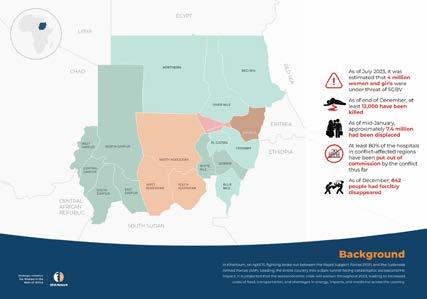
The prevalence of Sexual & Gender Based Violence (SGBV)
Rape is being used as a tactic of war in Sudan. As of July 2023, it was estimated that 4 million women and girls were under threat of SGBV – according to a Joint statement by Dr Ahmed Al-Mandhari, WHO Regional Director for the Eastern Mediterranean, and Dr Matshidiso Moeti, WHO Regional Director for Africa. Survivors of rape during this conflict range in age from girls of 4 years old to women of 60 years old.
Personal accounts from SGBV Survivors
“After [they raped us] they told us “Enough, we’re going. Those of you who want to leave, leave. If you want to stay, stay. We were completely shattered. I blacked out for a while, then after we awoke, we went out on the first street we found with a shop, and we asked him “where are we?” We didn’t know the area well, since we lived in a different area and only fled there because our area had lots of shooting.”
انك نحنف .اودعقأ اودعقت نيزياع ناك ،اوشمأ اوشمت نيزياع ناك وتنإ ،نيشام نحن صلاخ انيل اولاق اهدعبف عاتب اناقلا عراش لوأ ىلع انعلط ،انيعو ىتح ةرتفب اهدعب ،نمزلا نم ةرتفل يلع ىمغأ انأ ،ديدش نيراهنم سب يد ةقطنملا ناكس نم ام لاصأ نحن ،سيوك ةقطنملا فرعنب ام نحن ونلأ نيو نحن وهانلأسو ناكد برض اهيف ناك انتقطنم ونلأ اهيل انحزن نحن
“They dragged me until I was between two beds on a blanket I put out for when there were shooting or someone went downstairs, then they beat me and slapped me, calling me “dirty girl” because I had wet myself.”
.تحت لزنب ةجاح وأ برض يف نوكي نمل ةيناطبلا ةشراف نيريرسلا نيب تنك انأ ،ينورج اوماق ، تلب ناشع ابيرقت »ةسجن اي« ينيف اوتفكيو ينيف اوبرضي اودب ناك ينورج ،سبف
“They shot their weapons, but they didn’t find anything to take from us since we didn’t have gold or money. Then they raped my daughters. They screamed with all their might, and their brother couldn’t hold himself back. I told him if you don’t stay back, they will shoot you.”
،شورق اندنع لا بهد اندنع لا اهوليشي لاثم ناشع اندنع ةجاح لاصأ اوقل امو ،اد مهحلاس اوبرضو تقرم ول وهيل تلق انأ وهاكسام رداق ام مهوخأو ،نهسح لكب اوخرصب ،نينتلاا يتانب اوبصتغا ،مهملا كوصصريب
Civilian deaths & injuries
- As of end of December, at least 12,000 had been killed according to the United Nations Civilians Killed Displaced
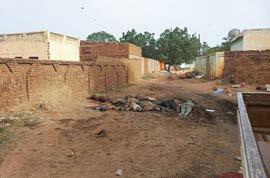
Internal & external displacements
- As of mid-January, approximately 7.4 million have been displaced according to UNOCHA .
Access to essential services such as health & education.
At least 80% of the hospitals in conflict-affected regions have been put out of commission by the conflict thus far – Source
At least, 17 have closed due to artillery attack (likely by the SAF), 20 were forcibly evacuated, and of those 20, 12 are now military bases for the RSF. Another 22 hospitals ceased providing services due to lack of supplies and staff and regular power outages combined with fuel shortages preventing reliance on generators during power outages. – Source
9,600 Cholera Cases suspected
6.5M Childre t of School
The collapse of the healthcare system, combined with limited access to water and other livelihood essentials, resulted in approximately 9,600 suspected cholera cases. 264 of these cases became fatal as of the 13th of January – Source
At least 13 health workers have been killed, 9 have gone missing, and 4 have been abducted by armed groups. Medical staff are afraid they will be abducted and forced to treat the wounded soldiers of their abductors. – Source
UNICEF estimates that 6.5 million children in Sudan can no longer attend school as a result of the conflict, bringing the estimated total number of children out of school in Sudan to 19 million. – Source
Status on enforced disappearances
As of November 2023, The Sudanese Group for Victims of Enforced Disappearance had recorded 715 people as forcibly disappeared, of those, 49 were confirmed to be women (47 adults + 2 minors). However, we assume that the number is higher because many families are afraid of reporting such incidences due to fear and stigma. Since November, the total number has risen to 842 forcibly disappeared persons, though The Sudanese Group for Victims of Enforced Disappearance has not yet published the gender and age disaggregated data.
AprilMayJuneJulyAugustSeptemberOctober KhartoumOmdurmanBahriAl-ObiedAl-FashirAl-GenaïnaZalingeiNyala
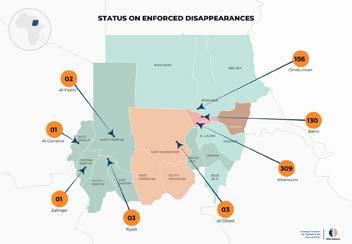
“The suffering of women in Sudan mirrors the suffering of women across Africa— we are being treated as collateral damage, rather than as agents of our own lives. The fundamental premise of the WPS agenda is that relegating women—and their rights—to the margins of decision-making further entrenches women’s exclusion and prolongs violence. This must change now.” - Statement by Ms. Hala Al Karib at the UN Security Council Open Debate on Women, Peace and Security 25 Oct. 2023
“It’s very dangerous to be out there and be a woman at this time in this dangerous war and this conflict zone because you always feel threatened and you’re targeted.” - Duaa Tariq in an interview with NPR
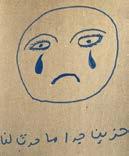
“We are alarmed by the acts of the RSF, which mirror the atrocities and war crimes committed in Darfur against civilians by the Bashir regime and his allies the Janjaweed militia, which was the forerunner of the current RSF. The acts of atrocities committed in Al Geneina amount to genocide and war crimes against civilians and HRDs. Those acts would not have happened had the international community and Sudan’s post-Bashir transitional government prioritized justice as an equivalent of peace and stability in Darfur.” – Source
Strategic Initiative for Women in the Horn of Af rica
For further inquiries, please contact: SIHA Network
+256706442912 / +256200 906263 info@sihanet.org
https: //sihanet org
SIHA Network @SIHA-Network @sihanetwork @sihanet
Strategic Initiative for Women in the Horn of Af rica (SIHA)
SUPPORT US: https://sihanet.org/support-us/
